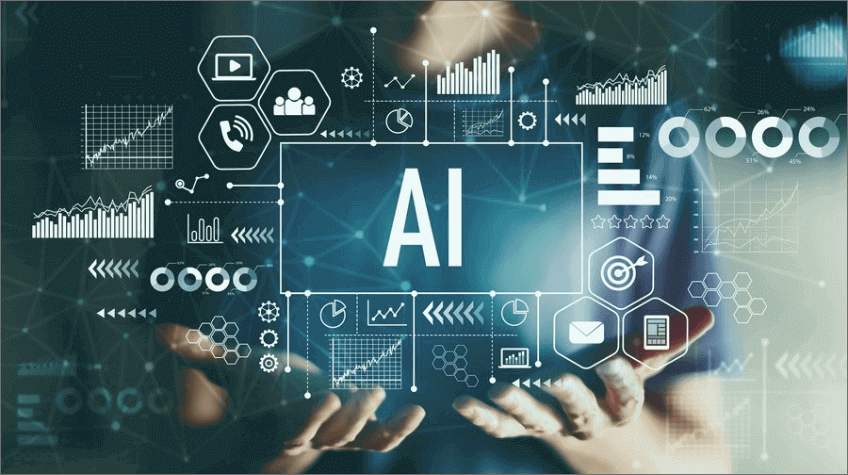AI-Powered Revolution:Unlocking Digital Transformation
AI-Powered Revolution: Unlocking Digital Transformation
An Overview of Key Trends and Best Practices
Artificial Intelligence (AI) is transforming the way businesses operate and has become a key driver in digital transformation initiatives. In today's fast-paced, technology-driven world, companies must leverage AI to stay competitive, optimize their processes, and provide enhanced customer experiences. AI can help organizations automate routine tasks, analyze vast amounts of data, and make better-informed decisions. This can lead to increased efficiency, cost savings, and improved overall performance. The importance of AI in digital transformation is highlighted by key trends and best practices. One trend is the adoption of AI-driven chatbots and virtual assistants, which can provide personalized and immediate customer service. Another trend is the use of machine learning algorithms to improve business operations, such as predicting maintenance needs or identifying fraud. Best practices for implementing AI in digital transformation initiatives include developing a clear strategy, investing in the right talent and technologies, and ensuring proper governance and ethics. As AI continues to evolve and transform industries, companies that successfully integrate it into their digital transformation initiatives will gain a competitive advantage and position themselves for long-term success.
AI-Powered Business Models
AI-powered business models have been a game-changer for many companies looking to achieve digital transformation. One such case study is a large e-commerce company that has leveraged AI to improve its customer experience. By using AI algorithms to analyze customer behavior, the company is now able to predict customer preferences and offer personalized recommendations to each user. This has led to increased customer satisfaction and loyalty, as well as higher revenue for the company.
Another example is a healthcare company that has implemented AI-powered tools to improve patient care. By analyzing large volumes of patient data, the company is now able to identify patterns and predict potential health issues before they become serious. This has led to improved patient outcomes and a more efficient healthcare system overall. These companies' success stories demonstrate the potential of AI-powered business models in achieving digital transformation and creating value for both companies and customers.
Key Considerations for Startups and Executives
As companies explore the benefits of AI for digital transformation, startups and executives need to consider several key factors when implementing AI in their strategy. One of the primary considerations is ensuring the availability of high-quality data, which is crucial for effective AI models. Companies need to collect relevant data, ensure its accuracy and completeness, and securely store it. This data can then be used to train and improve AI models, helping businesses make data-driven decisions.
Another critical consideration for companies looking to implement AI is the availability of skilled talent. With the demand for AI experts on the rise, companies need to invest in attracting and retaining AI talent. Startups can consider partnering with universities or investing in training programs to develop their team's skills. Executives can explore the potential of outsourcing to supplement their in-house talent or partnering with AI-focused firms to leverage their expertise. By investing in data and talent, companies can leverage AI to drive digital transformation and stay competitive in their industry.
Recruiting, Training and Retaining Top AI Talent
As AI becomes increasingly important to businesses, recruiting, training and retaining top AI talent has become a priority for companies looking to stay ahead of the curve. The demand for AI experts far exceeds the supply, which means that companies need to be creative in their recruitment strategies. Some companies have found success by partnering with universities and offering internships and co-op programs to students. This not only helps them identify potential talent early on but also provides students with valuable experience and exposure to the company's culture.
Once AI talent has been recruited, companies need to invest in training and development to ensure their skills remain relevant and up-to-date. This can involve providing access to industry conferences, workshops, and online courses. It's also important to create a culture of continuous learning and experimentation, where employees are encouraged to explore new AI technologies and techniques and share their findings with the team. Finally, to retain top AI talent, companies need to provide competitive compensation packages, opportunities for growth and advancement, and a supportive and collaborative work environment.
Metrics for Success and Potential Pitfalls
Measuring the impact of AI on digital transformation is crucial for businesses that are investing in AI technology to enhance their operations. Companies need to establish metrics that help them understand how AI is contributing to their digital transformation efforts. Some of the metrics that businesses can use to measure the impact of AI include cost savings, revenue growth, improved customer experience, increased efficiency, and better decision-making. These metrics provide valuable insights into the effectiveness of AI in achieving business goals and help companies identify areas that need improvement.
While measuring the impact of AI on digital transformation is important, businesses also need to be aware of potential pitfalls. One common pitfall is the over-reliance on AI technology. Although AI can improve business operations, it is not a substitute for human expertise. Companies need to strike a balance between AI and human capabilities to ensure that AI is used to augment human skills rather than replace them. Additionally, businesses need to be cautious about data privacy and security when implementing AI. Data breaches and cyber-attacks can be costly for businesses, both financially and in terms of reputation damage. Therefore, businesses need to invest in robust security measures and adopt best practices to protect sensitive data.
Author:
Sharda Kumari (LinkedIn)
Staff Systems Engineer, Airbnb Inc.

